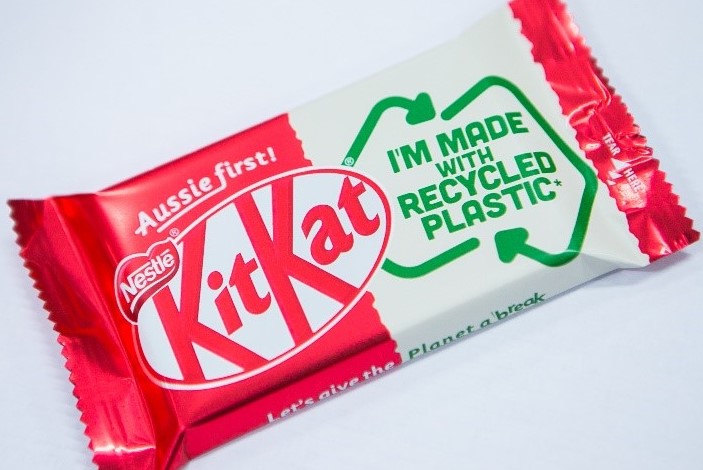
Today a lack of both collection and processing infrastructure makes it difficult to keep waste out of landfill and meet consumer demands for more sustainable packaging. The prototype KitKat wrapper (pictured) demonstrates the opportunity to close-the-loop on recycling soft plastics and has been created by a coalition of companies with a shared vision to resolve the challenge of plastic waste in the environment.
Partnering together, Nestlé, CurbCycle, iQ Renew, Licella, Viva Energy Australia, LyondellBasell, REDcycle, Taghleef Industries and Amcor leveraged their individual expertise to collect and process soft plastic waste, turn it back into oil using advanced recycling technology and create the prototype KitKat wrapper.
Simon Roy, Vice President & General Manager Amcor Flexibles Australia & New Zealand commented “This is an exciting time for Amcor and our participation in this project is fully aligned with our commitment to ensure all our packaging is designed to be recyclable or reusable by 2025.
“As the global leader for consumer packaging we were proud to contribute our expertise in designing a structure which meets consumer needs and has a responsible end of life where it can be reprocessed and reused in food grade packaging.
“Soft plastics create a strong consumer-friendly packaging solution with great barrier properties and are lightweight and cost efficient. This collaboration shows how soft plastics can be part of the circular economy when stakeholders across the entire value chain work together and is a fantastic outcome for the environment and our communities.”
Sandra Martinez, CEO of Nestlé Australia, added, “Between us, we have shown there’s a pathway to solve the soft plastics problem. Manufacturers like Nestlé will have a key role in driving demand for food grade recycled soft plastic packaging and creating market conditions that will ensure all stakeholders throughout the value chain view soft plastics as a resource and not waste”.



